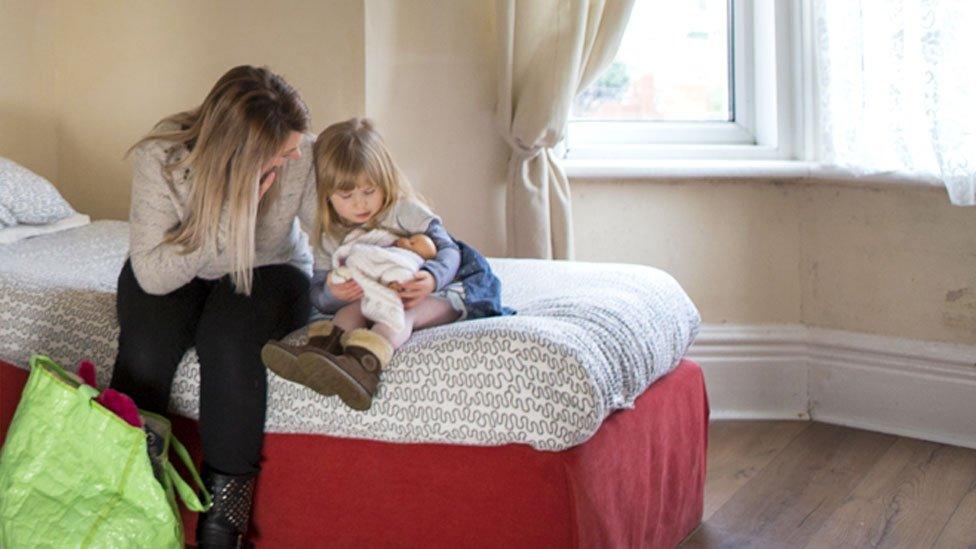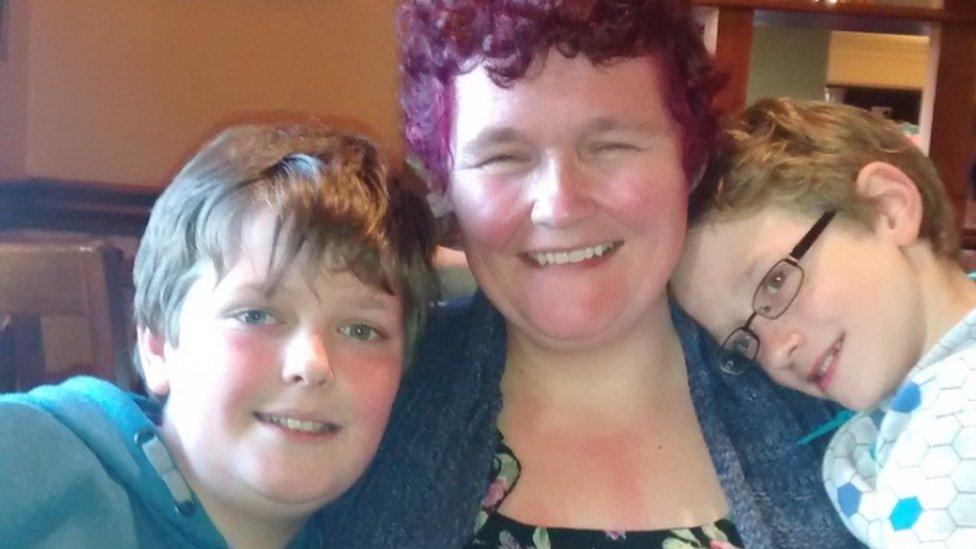Domestic Abuse laws 'will tackle injustice'
- Published
Domestic abuse survivor Rachel Williams says she hopes the next PM will be passionate about the issue
New laws to protect survivors of domestic abuse in England and Wales have been introduced in Parliament.
The Domestic Abuse Bill would place a legal duty on councils to offer secure homes for those fleeing violence and their children, and proposes creating a dedicated domestic abuse commissioner.
Victims Minister Victoria Atkins said it addressed "an injustice that has long needed to be tackled".
But Women's Aid said victims' services were operating "on a shoestring".
It is estimated that almost two million adults in England and Wales are victims of domestic abuse every year.
Measures in the bill, seen as a key part of Theresa May's legacy, include:
The first government definition of domestic abuse, which will include financial abuse and controlling and manipulative non-physical behaviour
Proposals for a Domestic Abuse Commissioner to champion survivors and hold local and national government to account on their actions
Domestic Abuse Protection Notices and Domestic Abuse Protection Orders, which would allow police and courts to intervene earlier where abuse is suspected
Prohibiting the cross-examination of victims by their abusers in the family courts
Automatic eligibility for special measures to support more victims to give evidence in the criminal courts
Ms Atkins told the BBC's Victoria Derbyshire: "Domestic abuse takes many forms, including emotional, economic and sexual abuse, and we're reflecting that in the definition.
"And that's important because that then has repercussion in terms of how services are commissioned locally to support victims and survivors."
Introducing the bill in the Commons, Ms Atkins the government recognised the "importance of building trust with victims to tackle this hidden crime".
Labour's Harriet Harman, former minister for women, said the bill was "an important step" in a "long struggle to tackle the scourge of domestic violence".
"I hope the next prime minister recognises this bill is the will of the house," she continued, suggesting that neither Boris Johnson nor Jeremy Hunt were "what you might call champions of the cause of tackling domestic violence".
In response, Ms Atkins said the bill was not "just a commitment of this prime minister".
"This is a commitment of the government. And we have the extra confirmation... that both leadership teams have confirmed to me that not only do the candidates support this bill they will also progress with this bill in the autumn."
Asked for more details about the domestic abuse commissioner, Ms Atkins said the government was in the process of appointing a "designate commissioner", whose name would be announced soon.
'Landmark moment'
Local authority spending on refuges for abuse victims fell from £31m in 2010 to £23m in 2017.
Charities say there is a dearth of services in many areas, and victims are being turned away when they seek help because refuges with diminished budgets cannot cope with the demand.
The minister said she "absolutely accepts" that funding "is part of this jigsaw", and was "absolutely clear that refuge accommodation must be part of this bill".
"There is more work to do on this bill, but we wanted to continue the momentum, get this bill introduced before recess, so we have a clear run in the autumn to begin the process of legislating it properly."
Rachel Williams, domestic abuse survivor, told BBC's Victoria Derbyshire it was a "start", but there was "lots to be built on".
"The resources have got to be put out there for frontline services," she said. "Unless people are on the ground at grassroot levels, it is fruitless."
Lucy Rose Hadley, from Women's Aid, told Victoria Derbyshire, the introduction of the bill was a "real landmark moment to improving response to survivors and their children".
However, she said more funding was key as services were still operating "on a complete shoestring".
She said the bill also did not include an assurance that migrant women could access refuges - which the charity has been campaigning for - but the government had promised to review that element further.
'Blocked'
The Step Up Migrant Women coalition - a group of more than 40 frontline BME and specialist domestic abuse service providers and human rights organisations - also called for greater protection for migrant women, regardless of their immigration status.
Chiara Capraro, Amnesty International's Women's Rights programme manager, said: "This is supposed to be a landmark piece of legislation that sets the bar for ensuring the protection and safety of people who experience domestic abuse.
"If some women are blocked from being able to access that support, the bill will fail."
Rebecca Hilsenrath, chief executive of the Equality and Human Rights Commission, said the bill was a "welcome step", but to achieve the transformation the government wants "it must protect everyone, including all migrant survivors".
Ms Atkins told MPs she had listened to concerns about those who feel trapped in relationships because of their immigration status, and said the government was "committed to reviewing the response to all migrant victims of abuse".
Labour's Jess Philips said the proposed legislation was "the first step", but was "delighted with the concessions and that we have been heard, specifically around migrant women".
Councillor Simon Blackburn, chairman of the Local Government Association's safer and stronger communities board, said councils "support a greater focus on prevention and early intervention measures" continued in the bill, but echoed the call for more funding.
- Published13 May 2019

- Published21 January 2019

- Published8 March 2018
